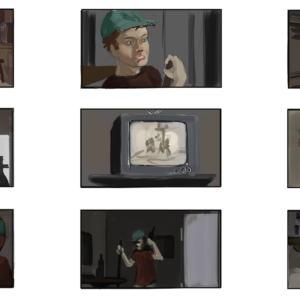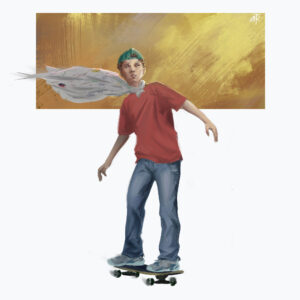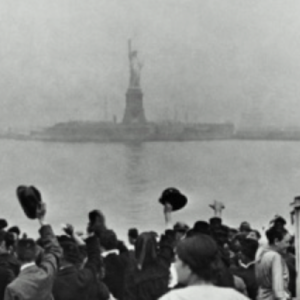If you are a worker in a specific field, these days are really hard. Covid-19 has brought tourism (I’m thinking about the hospitality industry, the transportation rentals, the small local cultural centers made for tourists) to their knees. The whole event industry is suspended because nobody would or could organize a convention, a product launch or any gathering in general (unless you are a denialist president); and the show biz industry was the first to close its doors and will be the last to open them back. Just try to be an actor, a sound technician, a stage assistant… or a video maker.

But today I’ll tell you about a project that has to come to grips not only with the virus, but even more with another problem: budget.
Giuseppe De Lauri is a freelance journalist, he works together with La Voce di New York, and has a compelling story ready, a short movie about immigration but also about the well-known concept of the “American dream”. However, in order to produce, you know, you need money, especially if you want to give dignity and professional value to your work. When the result depends on the collaboration of a group of people it is necessary to treat them with respect and work needs to be paid. And even if you try your best to contain the expenses, you still need a certain budget. The hard part, at this point, is to find someone who not only has the necessary amount, but also the interest and trust necessary to fund the project.
Crowdfunding campaigns are a huge source of opportunities, allowing people to present an idea to a large crowd that can participate in its realization with a donation; and that’s exactly what Giuseppe did: he relied on crowdfunding in order to allow his Hey Boy to see the light.
Giuseppe was born in Italy, in Parolise, a small village in Irpinia, but at one point he decided, as many other young people, to leave in order to broaden the experiences that Italy could offer. He passed briefly through Rome on his way to Paris, where he studied Film Studies and Literature first and then Contemporary History. Then, he moved to Berlin where he worked in e-commerce, and in 2017 he arrived in New York where he earned an MS degree in New Digital Media Design at NYU.
Since then, he has worked in advertising and in what is called Content Creation, i.e. multimedia content for different platforms. But since high school, what really moved him were the visual and literary arts. He would write in secret because he was convinced that he wasn’t good enough, as bad school grades would confirm, disappointing mom and dad.
A first experience in high school (a short movie he collaborated on both as writer and actor) will bring him to surround himself with people who love movies and art in general during his university years: actors, directors, video makers, singers, writers and stage performers, some of whom are still working with him.
Today in New York he reports on politics, communication, technology, and their inter-connectedness, because he’s convinced that today there is little that escapes these three areas and he has a secret wish which is no longer so secret: Hey Boy, the short movie I asked him about.

What’s the short film about?
“It’s a coming of age drama. A 14 year old is sent by his parents to an uncle in the US hoping for a better life. But the pursuit of the American dream crashes into a nightmare. The boy is stuck between the impossibility of going back and the obstacles that prevent him from going forward. In the end, he’ll find his escape in a third possibility, maybe the most congenial for him.”
Where does the idea for the movie come from?
“The idea comes from a true story. I was having dinner in an empty restaurant. The owner offered me some wine and we started to chat. He told me about his early years as a kitchen boy in his uncle’s business while his country of origin was on the verge of a civil war. The story struck me because even though our dynamics where different, we shared some events. Anyone who’s come to the US recently knows well what it feels like to be constantly opposed, even just from a bureaucratic perspective, by policies and a society that really don’t want you.”

How much and what do you have in common with the protagonist? Did you face difficulties as an immigrant or just as a person who has to find his way in this society?
“Actually, I have often walked in the protagonist’s shoes. It’s true, there are A-list and B-list immigrants in this country. I am definitely a lucky one because I have a family and a country (Italy) behind me that allowed me to study and grow healthy. But, paraphrasing Woody Allen, I can affirm that if there are some immigrants definitely struggling real bad, we – the lucky ones – don’t feel very well today. A series of subtle bureaucratic and legal procedures actually prevent a real integration. I’m convinced that if Einstein would immigrate to the US today, he would be stuck for life in the patent office instead of being allowed in a laboratory just because on his visa there would be written ‘employee at the office for intellectual property’.”
So, does the “American dream” really exist or is it just a way to sell an illusion?
“They say that the ‘American dream’ existed once, but it would be too easy to just say that. I know people that immigrated to the US and made the best they could out of it. So, I wouldn’t talk about “dream” anymore. In fact to want something badly is not enough anymore in order to get it, to be competent, to be the best at something is not enough anymore (if it was ever enough in the history of humanity). Nowadays, it’s all about chances or rather chaos. If from chaos you get into a series of lucky events, one after the other, and you meet the right person or your resume is picked from the pile, then your dream may start. Many call it just luck. But that’s exactly my point: can we leave all responsibility to luck?”

In fact, is it fair to call ambitions, expectations or even rights (to a decent life and equal access to opportunities) “dreams”?
“There is a big distinction between what a person wants and what a person can achieve, for better or for worse. A dream is unattainable by definition. We see it in the distance but it fades out once we get to the tangible. But then what’s the purpose of dreaming? It serves the purpose to advance, as Galeano (Edoardo, ed.) said about utopia. To put ambitions, dreams and rights on the same level means living in a utopia. Our generation, the disenchanted or rather the nihilistic one, has learned at its own expenses that this sort of world doesn’t exist. But whoever tries to reach it is admirable.
Does your Boy make it? And what about those who don’t succeed? This capitalist country is based on the idea of competition, success and failure and appearing as much as possible to be a winner: is the one that doesn’t make it necessarily a loser responsible for their own failure? Is it always “you should have done more; you didn’t do enough”?
“The central theme of the story is precisely this. Are we always responsible for our failure? And why should we be considered losers if we don’t reach or goals? I believe that we all felt, at least once in our life, the slimy feeling of ‘not being enough’ that sticks to you. The global society is based on competition, not just the capitalist American one. The world wants us to be competitive. ‘It’s a doggy-dog world’, as one of the story’s characters says. In fact, you just have to watch Bong Joo-ho’s movie Parasite, about the Korean suburbs, to understand that we are all children of the same mantra. What are the Kims running from if not the intimate social and family failures? With this short movie I wanted to stress that, despite the fact that the protagonist has what it takes to succeed, he ends up seeing all his efforts vanish due to external causes. The ending is open, we don’t know what will happen, we don’t know if the boy will soar or if he’ll crash.”

For your project a crowdfunding campaign is underway. How hard is it to be a filmmaker? How do you get the funds to produce?
“The access to capital has always been the main problem for filmmakers.

If we notice, funds and distribution platforms have actually grown. Yet, they’re not enough. How come? I believe that more and more people try to express themselves through movies and art in general, maybe because of the current media’s somnambulism and therefore there’s more competition. We launched the crowdfunding campaign with a marketing plan behind it, with a list of people we could rely on, with the support of friends and family. And that’s because the crowdfunding campaigns are fluid projects and it’s hard to define shapes and goals. We asked around to those who already had some experience, we attended workshops, I also lost some weight to be honest. Luckily, my co-producer Giulia Rocca is very well organized and with her calm she balanced my anxiety.”
How does a crowdfunding campaign work? What happens if you don’t reach the necessary amount on the deadline?
“There are several platforms and each one has its own policy. The Seed&Spark one has a “green light” if we get to 80%. With many others you have to reach the whole amount. If you don’t get it then you just say that it has been great, that you’ve tried, you feel ashamed and angry for a while and then that’s it. Just like that, for many failing to reach the goal means to throw away months of work, unfortunately.”
The shooting is scheduled for the end of November, in the middle of Covid. Show business (events in general) is among the most affected by the pandemic: how hard is it to work in the film industry at this very moment? Is it doable? How will the shooting take place?
“Many say that it’s crazy to shoot in the midst of Covid. Maybe they have a point, but I think that it may have its advantages: locations as well as equipment are cheaper, people in show biz are so eager to work, and passion is palpable. You need to respect the anti-Covid protocols, therefore a monitoring organization is required and I put my co-producers Giulia and Cheryl Wang in charge of it. Tests will be done 10 and 5 days prior to shooting. Temperatures will be taken at each entrance on set and we’ll observe social distancing. To do that we’ll need to work in watertight compartments, meaning that there won’t be more than 5 people at a time on any set: for instance, to prepare a scene, first the production designer and I step in to do a setup. Then the production designer steps out and the photography team steps in. Lights, camera, dolly are set up. Electricians and machinists step out and now it’s me, my talented director of photography Emiljia Gasic and her assistant. Then the assistant steps out and my assistant with the actors step in. We shoot the scene, then the actors step out and my producers step in to check on the shot. In short, I’ll be on set all the time.”
I express the wish that Giuseppe gets to risk more than the others, because if he needs to be on set all the time, it will mean that he succeeded in collecting the budget necessary to shoot his Hey Boy.
If you’d like to know more about it, you still have a few days to go on https://www.seedandspark.com/fund/hey-boy-ny#story where you’ll find a beautiful storyboard that presents the short movie, and if it convinces you, you’ll be able to support the project with a donation. If you can’t donate money but you want to support it anyway, here’s what you can do:
Follow the campaign on Seed & Spark. Once they’ve reached 250 followers they’ll issue a discount for the creators of this and future projects;
Follow the project on Instagram (@heyboyshortfilm) to see all contents and updates;
Share the following on your social media:
Help @_undeadburrito_ It’s an independent group of directors, support the project #BuyInFilm on @seedandspark! Support them here: seedandspark.com/fund/buy-in
If you’re interested in the project you can support show biz in a concrete way at a time of need. Good luck Giuseppe!












